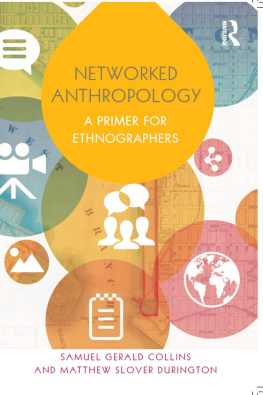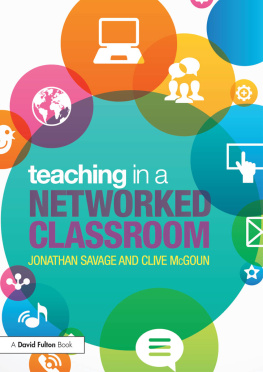
Networked Anthropology
The advent of social media offers anthropologists exciting opportunities to extend their research to communities in fresh ways. At the same time, these technological developments open up anthropological fieldwork to different hazards.
Networked Anthropology explores the increasing appropriation of diverse media platforms and social media into anthropological research and teaching. The chapters consider the possibilities and challenges of multimedia, how network ecologies work, the ethical dilemmas involved, and how to use multimedia methodologies. The book combines theoretical insights with case studies, methodological sketches and pedagogical notes.
Drawing on recent ethnographic work, the authors provide practical guidance in creative ways of doing networked anthropology. They point to the future of ethnography, both inside and outside the classroom, and consider ways in which networked anthropology might develop.
Samuel Gerald Collins is a Professor in the Department of Sociology, Anthropology and Criminal Justice at Towson University, USA.
Matthew Slover Durington is an Associate Professor in the Department of Sociology, Anthropology and Criminal Justice at Towson University, USA.
Networked Anthropology is an essential roadmap for conducting engaged anthropology on a rapidly changing digital terrain. Collins and Durington detail how anthropologists can make use of social media to link classrooms to local communities in ways that span the corporeal and the digital. They also point out both the potential ethical pitfalls and the unexpected benefits of embracing social networks at every stage of the research process.
P. Kerim Friedman, National Dong Hwa University, Taiwan, and founding member of Savage Minds
Contemporary anthropologists share a networked world with research participants and other interlocutors a world in which we are all producing and consuming media throughout the ethnographic encounter. Collins and Durington examine how social media inexorably reshapes the field in both senses (fieldsite and disciplinary practice) and can potentially generate a more nuanced, ethical, public anthropology premised on reciprocity, sharing, and dialogue with participants and audiences.
Krista Harper, University of Massachusetts Amherst, USA
Networked Anthropology
A Primer for Ethnographers
Samuel Gerald Collins and Matthew Slover Durington

First published 2015
by Routledge
2 Park Square, Milton Park, Abingdon, Oxon OX14 4RN
and by Routledge
711 Third Avenue, New York, NY 10017
Routledge is an imprint of the Taylor & Francis Group, an informa business
2015 Samuel Gerald Collins and Matthew Slover Durington
The right of Samuel Gerald Collins and Matthew Slover Durington to be identified as authors of this work has been asserted by them in accordance with sections 77 and 78 of the Copyright, Designs and Patents Act 1988.
All rights reserved. No part of this book may be reprinted or reproduced or utilised in any form or by any electronic, mechanical, or other means, now known or hereafter invented, including photocopying and recording, or in any information storage or retrieval system, without permission in writing from the publishers.
Trademark notice: Product or corporate names may be trademarks or registered trademarks, and are used only for identification and explanation without intent to infringe.
British Library Cataloguing in Publication Data
A catalogue record for this book is available from the British Library
Library of Congress Cataloging in Publication Data
Collins, Samuel Gerald.
Networked anthropology : a primer for ethnographers / Samuel Gerald Collins, Matthew Slover Durington.
pages cm
1. Anthropology--Computer network resources. 2. Ethnology--Computer network resources. 3. Anthropology--Research. 4. Digital media. 5. Social media. I. Durington, Matthew Slover. II. Title.
GN13.5.C65 2014
302.231--dc23
2014013542
ISBN: 978-0-415-82174-2 (hbk)
ISBN: 978-0-415-82175-9 (pbk)
ISBN: 978-1-315-76067-4 (ebk)
Typeset in Bembo
by Taylor & Francis Books
Contents
Figures
Tables
Over the years that this project has unfolded, many people and institutions have given us invaluable assistance.
First, we acknowledge the generous support of the National Science Foundation. We were fortunate enough to have received 2 grants (Grant No. 1062843 and Grant No. 1156767, respectively) from NSF to conduct 4 years of research with undergraduates. We feel obligated to let you know that any opinions, findings, and conclusions or recommendations expressed in this material are those of the author(s) and do not necessarily reflect the views of the National Science Foundation.
Second, we have received considerable helpfinancial and otherwisefrom Towson University, including our Dean, Dr. Terry Cooney, his staff, our Provosts office and our Office of Sponsored Research.
Third, we received a small (but very much appreciated) Ethics Grant from the American Anthropological Association. Part of is from a blog post we did for the AAA Ethics Committee website (An Ethics of Multimedia Practice?). Our thanks to them for the grant and for permission to reprint that text here.
But the bulk of our acknowledgments need to go to our many collaboratorsand there have been many of them over these past years. First of all, wed like to thank all of our student participants in Anthropology By the Wire. The project has been formative for our thinking; over the years, a multimedia anthropology has gradually turned into a networked anthropology.
From our 2011 iteration:
Multimedia Logistics: Jay Simpson
Research Team: Grace Lee, David Rico, Zach Myers, Niloofar Jebelli, James de Loach, Colleen Slebzak, Franco Tartaglia, Ella Michel-Tyler, Cara Heasley, Julian Beckles, Chantell Chaney and Brandon Kinion
Undergraduate Learning Assistants: Alice Brierly, Natalie Demyan, Abby Duffield, Timothy Fadden and Glenn Daniels Jr.
From our 2012 iteration:
Multimedia Logistics: Glenn Daniels
Research Team: Asim Mahmood, Seth Eyring, Shane Cromwell, Rachel Smith, Victoria Cooke, Samantha Adamson, Glenna Urquhart, Morgan Bengel, Zayd Tajiddin, Blessing Ukpong, Lian Thang, Ben Baker, Susanna Waldman and Brittany Noble
Undergraduate Learning Assistants: Natalie Demyan, Alice Brierley, Tim Fadden and David Reische
Undergraduate Learning Assistants in Training: Raul Ceballos, Sarah Becker and Olka Forster
From our 2013 iteration:
Multimedia Logistics: Natalie Demyan
Research Team: Kaila Hough, Stephen Mince, Pamela Holland, Diana Bridgett, Shul Sargent, Elizabeth Abosch, Danielle Reaves, Tavon Palmer, Chanel Scott, Leon Mait, Tavon Johnson and Libby Frank
Undergraduate Learning Assistants: Olka Forster and Raul Ceballos
From our 2014 iteration:
Research Team: Danae Bell, Mosunmola Ibrahim, Emmy Whittington, Ziggy Taylor, Crystal Santiful, Moses Wamalwa, Matt Harman, Josh Petrone, Meredith Park, Jessica Tieffel, Reine Lucas, Chaya Barrett, Annie Schwartz, Olivia Harries
Undergraduate Learning Assistants: Cameron Rines, Claire Emery, Ben Baker, Raul Ceballos
Graduate Director: Natalie Demyan
We have also worked with a wide and growing network of community collaborators, including: JACQUES, Wide Angle Youth Media, Baltimore Heritage, United Workers, HopeSprings, the Mid-Atlantic Chapter of Habitat for Humanity, Pauls Place, Sharp Leadenhall AME, The Sharp Leadenhall Planning Committee, The South Baltimore Partnership, and United Steel Workers Local 9477. There are numerous people to name that make these partnerships so worthwhile for us and our students including Betty Bland-Thomas, Thomas Gillard, Alexandra Reitz, Derrick Spencer, Susan Malone, Bridget Sullivan, Kelly Brady, Eli Pousson, Johns Hopkins, Pastor Ruth Travis, Mike Lewis, Bill Barry, Chris MacLarion, Elsa Lankford, Brian Plow, Harjant Gill, Heather Hax, and Nicole Fabricant. And, more than anyone else, we want to thank the folks that have become part of our collaborations by giving us their time for interviews over the years and working so diligently with our students. Lastly, thanks to the City of Baltimore and the citizens that truly make this place Charm City.
Next page








